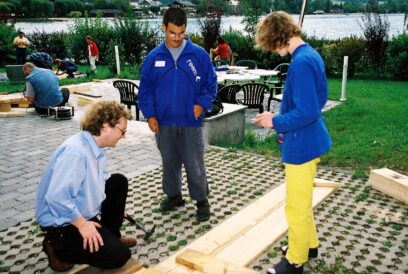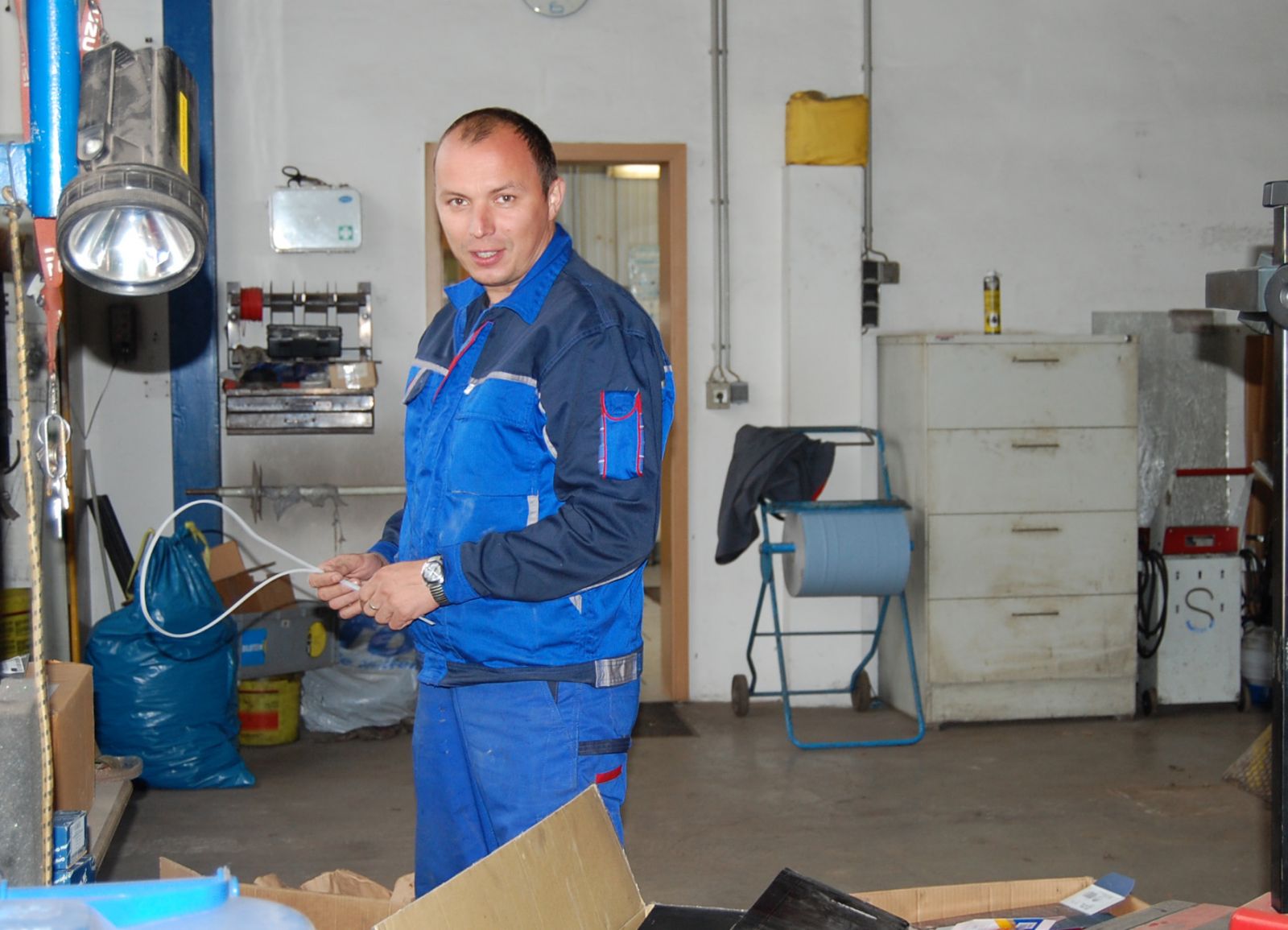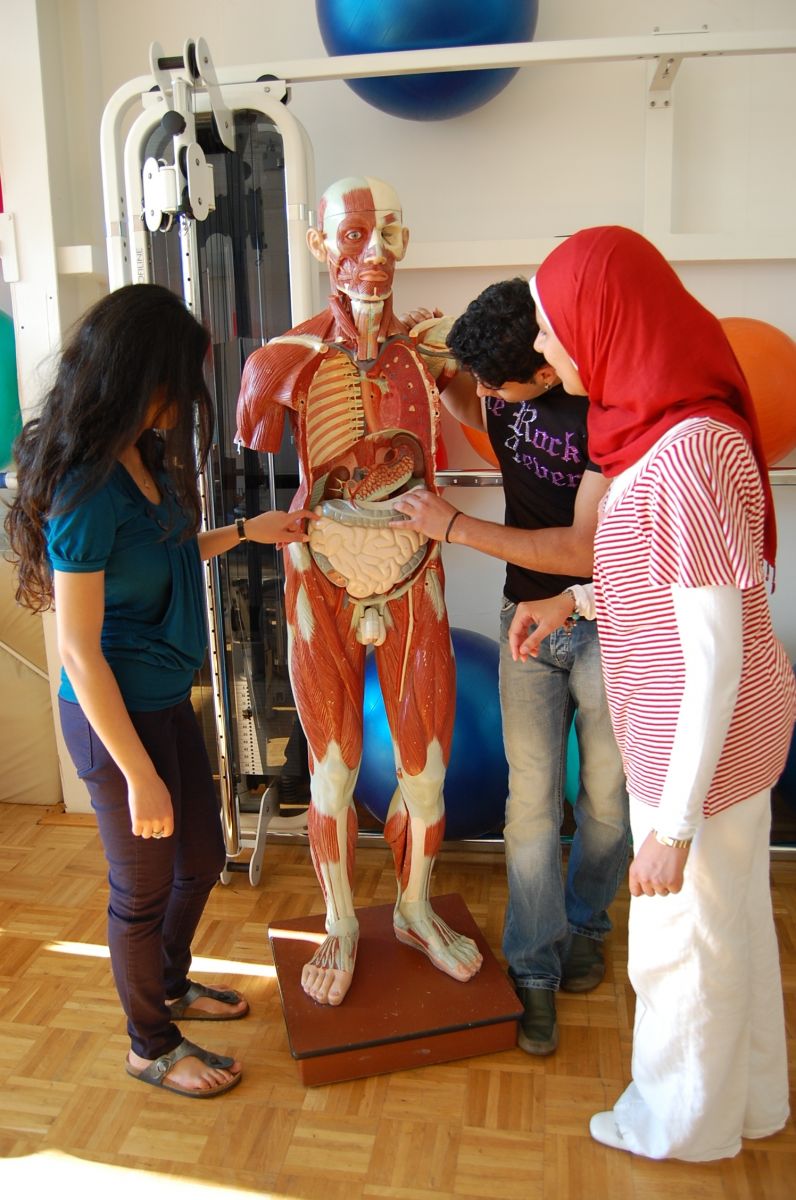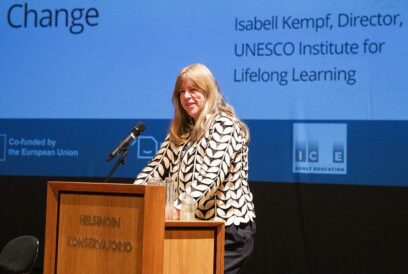

Migration and rural areas – a challenge for adult education in Thuringia
Published:Migrants are a much needed but problematic issue in rural areas. Adult education creates novel ways of integration.

Learning through practice at a workshop.
Photo: Archiv der Kvhs Weimarer Land
Introduction
This article focuses on migration in the federal state of Thuringia, which also represents the situation in many other rural areas in Eastern Germany. Reports about the increasing shortage of workers on the labour market are appearing more and more frequently in Thuringia. The situation for initial training is equally getting worse. A few years ago, the vocational schools and institutions in Thuringia still had the problem of not having enough training slots available for young people. Today, we can see the closure of educational organisations that fell victim to the drastic decline in the birth rate in the former GDR after the reunification.
If we take into consideration the workers who have been migrating to the Western parts of Germany and abroad over the past decade, we begin to understand the current demographic situation in Thuringia as well as in eastern Germany. The decision made by the German government to increase the retirement age to 67 years old and measures to ensure the employment of women (e.g. establishing the legal basis for early child care all over Germany) can no longer slow down the negative demographic trends, particularly on the labour market.
Compared to other federal states, Thuringia has the second lowest percentage of migrants (2.2%) and the lowest percentage of migrant workers (0.7%). The current migration process in Thuringia does not play a noteworthy role in tackling the demographic situation that has occurred, although it could really be a blessing in disguise for the future development of the state.
Migrants face promises and challenges in rural areas
At first sight, rural regions offer many opportunities to successfully integrate migrants. In smaller communities, social connections are well established. A new citizen will not just vanish into obscurity. Establishing more contacts, individual and attentive support and local consultation provide better prerequisites for integration than in a large city. The traditional associative life in the countryside offers almost ideal general conditions to quickly and successfully include new citizens in the cultural and social structure of the community. Particularly sport clubs can be a very good platform to integrating younger migrants.
Moreover, smaller religious communities tend to focus on carefully advising families and individuals on daily life and on providing pastoral care. Rural and municipal adult education centres that are available and open to everyone provide a wide education programme to newcomers. Adding in the growing demand of small and medium-sized companies for workers, the prerequisites for new migrants to feel at ease and needed appear almost ideal.
However, migration processes are not as positively influenced by these factors as one would hope. According to our observations, most of the rural communities perceive more risks than opportunities in migration. The prospect of dealing with foreigners seems to pose several problems to the locals. Since the number of migrants in the rural regions of Thuringia is low, the locals rarely personally encounter one or several migrants. This creates a greater distance in the willingness to communicate and plenty of room for uncertainty when migration is discussed in the community or in groups of families or friends.
Due to unfamiliarity with the integration process, the communities have unrealistic expectations for the migrants’ speed of learning the language and accepting local customs and traditions. Locals expect nearly instantaneous integration. Particularly in areas where social tensions already exist, discussing potential migration sometimes paves the way for prejudice and even extreme right-wing ways of thinking.
Further, only a few communities have a well-thought out municipal integration policy that is based on demographic facts and intercultural knowledge. This is one of the main causes for the lack of intercultural openness for migration. Moreover, since migrants are rarely involved in municipal decision-making processes, they often feel unwelcome.
In addition, political decisions on local integration efforts are negatively affected by the continuing decreases of municipal budgets. Since the majority of locals have private means of transportation, the investments in public transportation infrastructure are usually the first expenditures to be cut. Migrants soon realise how the weak public transport system in the countryside severely limits their overall mobility and their ability to seek jobs outside of the small community they currently reside in, making the rural regions less attractive.
Facing the lack of acceptance by the locals, the often half-hearted integration policies and weak infrastructure, the majority of migrants will avoid or leave rural regions to find more accommodating areas to live and work. While adult education centres cannot influence the economic environment of the rural areas, they have the ability to both train the migrants and educate the local community to shape a more fruitful integration process.
The importance of adult education centres
All stakeholders involved in integration agree on one thing: without a working knowledge of the German language, all doors to successful integration will remain closed. Since 2005, the year that the Immigration Act was passed in Germany, the most important offer for people with migrant backgrounds has been an integration course consisting of language teaching and orientation sessions, which convey the basic political, legal, economic, social and cultural aspects of living and working in Germany.
Municipal adult education centres (Kreisvolkshochschulen) have taken a central role in local integration since they not only have a presence in smaller rural communities but also they have the required resources and skills to support migrants needing education and advice. As a non-profit organisation, adult education centres place great importance on creating sufficient learning prerequisites. Above all, learning in small groups, consistent continuing education offers for the teaching staff and, where possible, social-pedagogical support for participants are the specified quality aims for successfully completing the course at adult education centres in Thuringia.
Adult education centre staff are specifically trained to incorporate the development of intercultural skills into their language classes. Every day, language teachers pass on their knowledge gained about intercultural skills to their participants. In this process we assume that nobody has the natural ability to confidently switch between cultures. Intercultural skills are rarely achieved through on personal experiences but are rather based on broad intercultural knowledge and the trained ability to apply this knowledge. Intercultural knowledge and its application in everyday situations make the transition into unfamiliar territory much easier on migrants.
Integration through traineeships
The adult education centres in Thuringia have been increasingly successful in building bridges between regional companies and migrants looking for work. In 2007, the Weimarer Land district adult education centre (Kreisvolkshochschule Weimarer Land) started to supplement the integration course both by organizing a social language internship at small and medium-sized companies and by providing a job potential analysis for the participants. Under our ambitious motto “from coexistence to cooperation”, we want to achieve a whole range of aims:
The first aim of the traineeship programme is to strengthen and develop the learned language. However, we do not stop at achieving theoretical proficiency. Before the internship (and after the first two months of training) many migrants believe that their skills are sufficient to live and work in Germany. However, experiencing a real life work environment exposes gaps between the perceived and the actual understanding of the language, motivating the migrants to work much harder in the remaining part of the language courses.
The second goal of the programme is to achieve social inclusion. It is our aim to find work settings where social integration can be fostered. We have found that small companies usually present a small work force with strong social ties, which is more likely to show interest in the migrant’s social and personal life. Hence, migrants have the chance to go beyond observing German social communication and customs and actually becoming part of the team.
The third stated goal was to give the participants insights in the inner workings of the company and expose them to new professions. Moreover, it also gives them a chance to show their skills, motivation and their interest in becoming a working professional again.
Last but not least the traineeship was an attempt to remove aforementioned prejudices on both sides. However, bringing together the people involved in the project was not always an easy task. To minimise the fear of contact from the start, both parties had the right to immediately end the internship if there were any problems. In our experience this clause has increased the willingness from both sides to organise and do internships but it has rarely been used. Participation in the project rather culminates in insecurities on both sides being reduced, sometimes in friendships and often in permanent jobs.
Here are the views of an employer and a participant, both of whom are involved in the project:
“I am not sure if we would have employed Mr Belyh had he not done an internship with us first because there were language difficulties. But during his internship we got to know him, discovered his working methods and skills – and there was no doubt there! … It is a shame for both employees and employers if a few linguistic mistakes do not allow a potentially top-class employment relationship to develop.” (Strab Ingenieurholzbau Hermsdorf GmbH, Managing Director Matthias Tremel)
“My workplace is easy to reach – it is only five kilometres away from my house. It is a small luxury that I can travel to work nearly every day by car. In the company I am the only non-native German speaker but I like my colleagues and we work well together. … I am so pleased that I got a permanent position at Hörisch Präzision and I place great importance on doing my job well and reliably and continuing to do so in the future. Since I came to Germany I was able to gain other work experience but I have found my place at the company I work for now.” (Mr Wladimir Funkner, project participant)
The results of this project were so convincing that, since 2008, we have been able to implement this project at 12 adult education centres due to the funding from the Thuringian Interior Ministry. The adoption of the programme on a state level shows that a small programme can shape regional policy and that educational institutions can have a positive impact on the integration of migrants in rural communities.
Incorporating intercultural skills into vocational training
Based on the success of the traineeship project, the adult education centres in Thuringia and the Thuringian Association of Adult Education (Thüringer Volkshochschulverband e.V) have been able to launch a great deal of innovative projects in the field of integration. One noteworthy example is the “German for Professional Purposes” programme initiated by the German Federal Office for Migration and Refugees (BAMF) which was funded by the European Social Fund (ESF). The aim of the BAMF-ESF programme is to help unemployed migrants to re-join the workforce, by not only improving their language and intercultural skills but also by providing basic vocational training to prepare for further education required for the various careers.
Since 2010 the Thuringian Association of Adult Education has been executing the programme locally and has coordinated with over 38 vocational schools in Thuringia. The adult education centres have prepared approx. 1,000 participants in 64 courses linguistically and professionally for the German labour market in a wide variety of occupations. The concept from the Weimarer Land district adult education centre and the vocational school WFP (WFP Berufsfachschulen Bad Sulza) in the field of care/medicine was awarded a Best Practice Example award by the BAMF. The two week course was an overall success because it integrated language, social, intercultural as well as theoretical and vocational components to provide a deep insight into the future career. After completing the course, nearly 40% of the participants had re-joined the workforce and an additional 30% of the participants expressed a strong interest in a career in the nursing/care field.

Hands-on in a theory class.
Photo: Archiv der Kvhs Weimarer Land
An important factor for the success of this special medical project – mainly in the field of nursing and care – was that participants had their travel expenses funded. This meant that the interested people, even from smaller and more distant places, could actually take part in the course. In some cases the people carrying out the project had to organise joint transport. If Germany wants to integrate migrants in rural areas, the prerequisites for funding educational projects must take into consideration such special conditions.
Taking an active role – Bringing migrants to rural Thuringia
In a follow up project with the ESF the Weimarer Land district adult education centre took a more proactive role in the integration process. Instead of only training local migrants, a programme was started to bring foreigners to Thuringia to meet the demands of the local economy. In autumn 2012, the first foreign trainees from Hungary started their dual training in the hotels in Thuringia with the help of the Thuringian Chamber of Industry and Commerce. At the start of the training, there were some unexpected problems. Since their knowledge of German did not meet expectations, some hotels sent the young people from Hungary to a German course to attend alongside their training at the Weimarer Land district adult education centre.
Thanks to the funding of the ESF BAMF programme, all seven participants were able to successfully complete the first year of their training and successfully pass the German exam. The survey carried out among our participants after the course finished brings hope that participants will complete their training and Germany – as well as Thuringia – will remain a place for work in the future plans of the trainees.
This is how a young Hungarian, László Márk Fülöp, assesses his participation in the course:
“Not all of our peers are lucky enough to attend a German course [at the adult education centre] along with our regular vocational training. We have already learned so much that we can use in our professional lives as well as in general. … Of course we learn about the German culture and society. I think this is very important. Because you have to understand the locals if you want to be successful. I would like to say thanks to everyone who works, speaks, lives or meets with us…”
Adult education centres influence local attitudes
The fact that the majority of migrants – equipped with a lot of knowledge from us – are still leaving Thuringia cannot solely be explained by weak rural structures and fewer jobs. This perception would explain the actual image of migration to and from Thuringia far too easily. The lack of a welcoming culture, particularly in rural areas, seems to be one of the most important reasons for migrants to “move on”.
The administrative departments in the small communities play an equally important role. The people with migrant backgrounds are involved with them from day one. There are too many deficits in these structures to call them open and tolerant. In many places there is a lack of employees who speak foreign languages. Not even English seems to be a standard skill of the local authorities. In relation to this, there is a common opinion that it is not absolutely essential to have this skill to work with migrants. The expectation that new migrants can express themselves clearly and can pick up bureaucratic language after a very short period is widespread.
Even at regional companies, stereotypical ways of thinking prosper. Some business owners think that an accent equates with a lack of knowledge, which leads to discriminatory decisions when they employ new personnel. The observation cannot be denied that the accent of migrants who are already employed makes colleagues and customers assume that migrants are lacking professional skills. More often than not, speaking with an accent is equated with a lack of education and knowledge.
Accepting and supporting multilingual families
It is alarming that the local authorities as well as schools, nurseries etc. often show a negative attitude towards maintaining the migrants’ native language. It is mistakenly seen as an obstacle to learning proper German. Particularly children from families with migrant backgrounds suffer from the pressure of having to speak only German in order to learn the language and to achieve better results in school.
Instead of specially trained language teachers giving more support to children and integrated measures that aim to give children the opportunity to practice speaking German by creating situations that are similar to real life where students can immerse in the foreign language, the parents are often criticised that the family speaks their mother tongue at home.
These well-intended suggestions sometimes hurl families into serious identity crises, and make parents question their parenting skills. The locals do not know enough about possible negative consequences, such as double semilingualism, ensuing if young migrants’ own mother tongue is left seriously impaired.
Since 2013, the adult education centres in Thuringia have been initiating discussions on this subject in the Integration Advisory Council of the Thuringian Government. Fortunately, there are already positive signs from the Thuringian Ministry for Education, Science and Culture, which has indicated its interest to supplement the recommendations for teachers on this subject.
At the same time, the Thuringian Association of Adult Education is gaining its first experiences in a European project “Multilingual Families” to maintain and support the lingual and cultural diversity in multilingual families. The result of the project is learning materials and methods on maintaining the migrants’ native language. They are meant for parents with migrant backgrounds who would like their children to grow up bilingual or even multilingual.
Conclusion
Adult education centres have done integration work for years, which has resulted in new seminar concepts for parental work in schools and continuing education offers for providers and teachers. The network of adult education centres with other education organisations and regional companies, who see integration work as important, is becoming bigger and bigger.
Adult education centres are not the only actors that can positively influence migration and local integration process. Today’s migration situation in Thuringia has called for the Thuringian Association of Adult Education to discuss openly and publicly the development of the welcoming culture. Annual conferences on migration and integration are important ways to discuss with the public. Several professionals of integration work in Thuringia as well as political and press representatives are invited to these annual conferences. The press’s reaction to these events confirms our thoughts that the adult education centres can and must cultivate tolerance and openness towards foreigners.
Through small educational steps, rural areas can become a new home for many new people. The subject of the last conference of the Thuringian Association of Adult Education held in May was “Thuringia – intercultural and open?” Now time will tell when the question mark at the end is no longer necessary. The adult education centres in Thuringia are doing plenty to make sure that we do not have to wait too long for this day.





